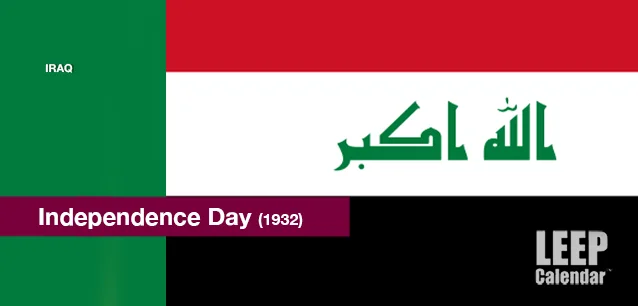 AD
AD
Today is: November 24
Scroll to explore events active on this date.
LEEP INK FEATURES

Nuanced November 2024
November is the start of the holiday season in many parts of the world. It is a time for family, football, food, shopping and decorating, particularly in the Christian and Jewish world, leading to Christmas and...

December's Gift
Events in December 2024. Well, we made it to December. December is the holiday season, particularly in Western nations, where Christianity and Judaism are the faiths most common in the nation's past. ...

August is Appropos
A toddler playing in the fountain at a park in Santa Fe, New Mexico—Photo LD Lewis. In August, we live through the Dog Days of Summer. It's hot and often humid, and those ...
About Iraq's Independence Day
Civil Rights , Middle East/West Asia
Ends: Oct 03, 2024
DESCRIPTION:
INDEPENDENCE DAY IN IRAQ:
A CELEBRATION OF ANCIENT HERITAGE AND FREEDOM
Iraq's Independence Day, observed annually on October 3rd, marks the anniversary of the country's independence from British control in 1932. This day is a significant milestone in Iraq's modern history, as it commemorates the nation's emergence as a sovereign state after years of foreign rule and a long history that stretches back thousands of years.
In 1932, Iraq made history by gaining independence from the United Kingdom, becoming the first Arab country in the Middle East to achieve full sovereignty. This milestone was a significant shift in the region's dynamics, as the British had established a mandate over Iraq after the First World War under the terms of the Treaty of Versailles, which dismantled the Ottoman Empire. Before World War I, the region that is now Iraq was part of the Ottoman Empire and was known as Mesopotamia—a name that reflects its ancient heritage as one of the cradles of civilization.
AN ANCIENT LAND AND PEOPLE
Iraq's history is among the oldest in the world. The land of Mesopotamia, meaning "between rivers," referring to the Tigris and Euphrates, is often called the "Cradle of Civilization." This region was home to some of the earliest known civilizations, including the Sumerians, Akkadians, Babylonians, and Assyrians. These ancient peoples made significant contributions to writing, law, and urban development, with the invention of cuneiform writing and the establishment of the first cities.
Iraq's civilization is at least 7,000 years old, with some of the oldest cities in the world located within its borders. Ur, Uruk and Babylon are among these ancient cities, each playing a crucial role in the development of early human societies. Babylon is renowned for its Hanging Gardens, one of the Seven Wonders of the Ancient World. Ur is the birthplace of Abraham, a key figure in Judaism, Christianity and Islam. Abraham is believed to have left Ur and arrived in Rafia, Caanan/Philistine (modern-day Rafah in the Gaza Strip, Palestine) around 1150 BCE.
CELEBRATING INDEPENDENCE DAY
Independence Day in Iraq combines national pride and reflection on the country's rich heritage with official ceremonies, military parades, and speeches by political leaders emphasizing national unity and sovereignty. In major cities like Baghdad, Basra, and Mosul, public squares feature Iraqi flags, and citizens participate in festivities that include cultural performances, traditional music, and dances that showcase the country's diverse heritage.
Independence Day in Iraq is a poignant time to honor the resilience of the nation and its people, who have endured decades of conflict and hardship. The day serves as a powerful reminder of Iraq's long journey through history, from the ancient civilizations of Mesopotamia to its struggles for independence in the 20th century and its ongoing efforts to build a stable and prosperous future.
Iraq's Independence Day is more than just a celebration of political freedom; it is a tribute to a land that has been a crossroads of cultures, ideas, and empires for millennia and a symbol of its people's enduring spirit.
VIDEOS
SUPPORTING DOCUMENTS
Currently, this event does not have supporting documents.
ADDITIONAL IMAGES
Currently, this event does not have supporting images.
Where would you like to go now?
 AD
AD


/footer-logo.svg)
